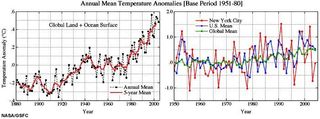Toasty 2005? Year Could Become Warmest on Record

Last year was the fourth warmest since the late 1800s and climate conditions in place could cause 2005 to be the warmest, NASA scientists said this week.
The analysis of 2004 data by NASA confirms figures for 2004 released in December by the World Meteorological Organization. The numbers are based measuring stations around the globe, with each day's high and low being averaged. Temperatures are recorded on land and at sea, in part with satellite data.
The 2004 average temperature at Earth's surface around the world was 0.86 Fahrenheit (0.48 degrees Celsius) above the average temperature from 1951 to 1980, NASA scientists said.
The warmest four years since 1890s, when reliable record-keeping began:
- 1998
- 2002
- 2003
- 2004
"There has been a strong warming trend over the past 30 years, a trend that has been shown to be due primarily to increasing greenhouse gases in the atmosphere," said James Hansen of NASA's Goddard Institute for Space Studies.
In any year, temperatures around the world can be nudged up or down by short-term factors like volcanic eruptions or El Ninos, when warm water spreads over much of the tropical Pacific Ocean. The large spike in global temperature in 1998 was associated with one of the strongest El Ninos of recent centuries, the scientists say, and a weak El Nino contributed to the unusually high 2002-2003 global temperatures.
Manmade pollutants play a role, too, most scientists agree. Hansen said Earth's surface now absorbs more of the Sun's energy than gets reflected back to space.
Sign up for the Live Science daily newsletter now
Get the world’s most fascinating discoveries delivered straight to your inbox.
That extra energy, together with the weak El Nino, is expected to make 2005 warmer than the years of 2003 and 2004 and perhaps even warmer than 1998, which had stood out as far hotter than any year in the preceding century, according to a NASA statement.
Hansen and his colleagues also note that global warming is now significant enough that it is beginning to affect seasons, making them warmer than before on a more consistent basis.
Some scientists argue that the human contribution to global warming has been insignificant.

